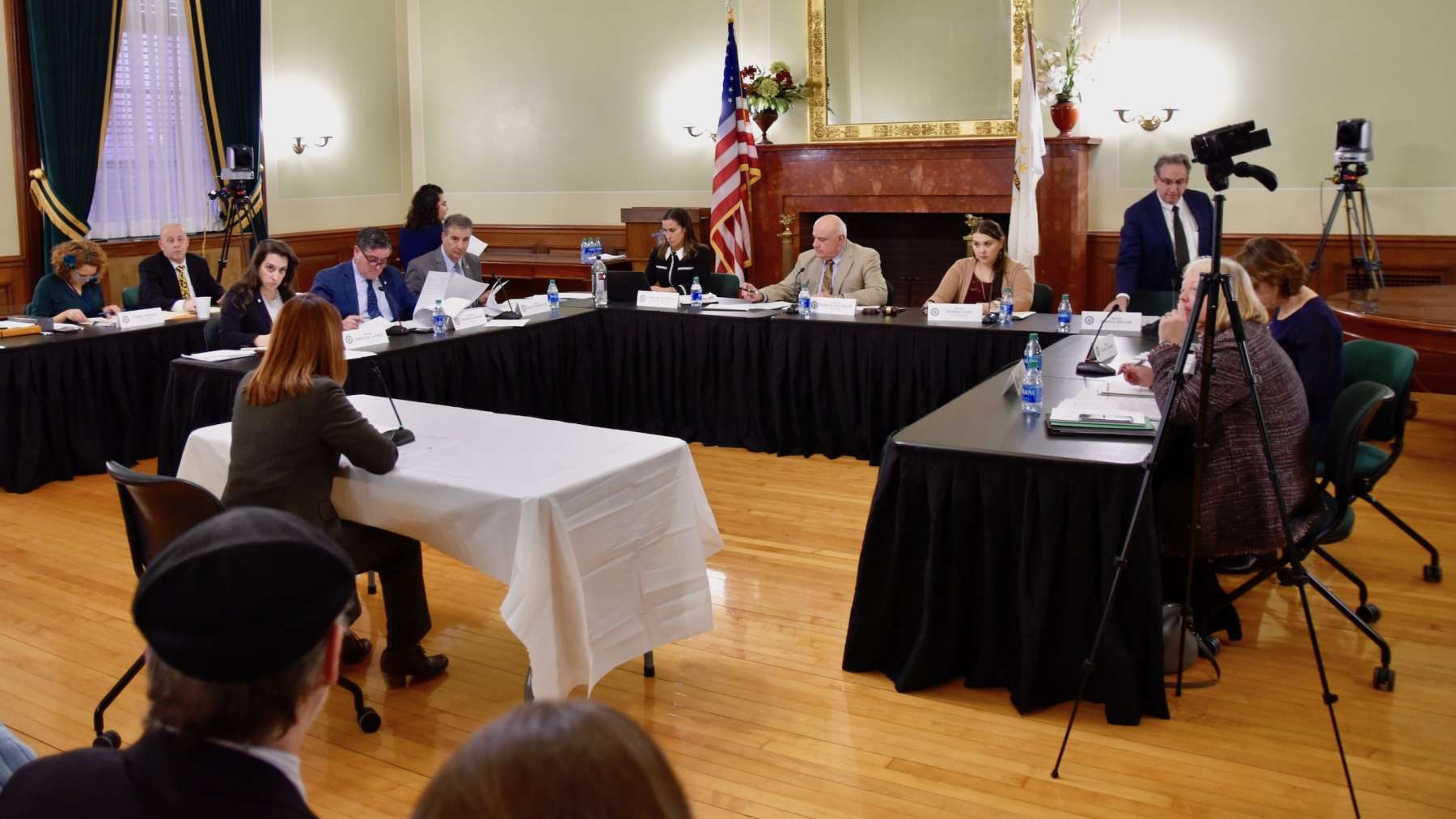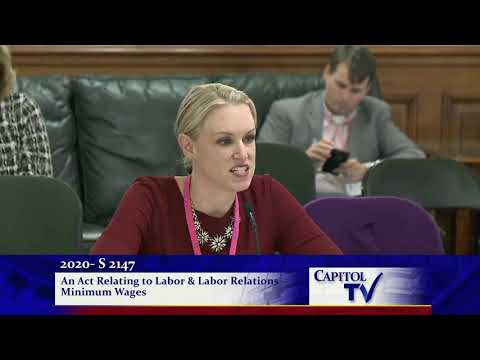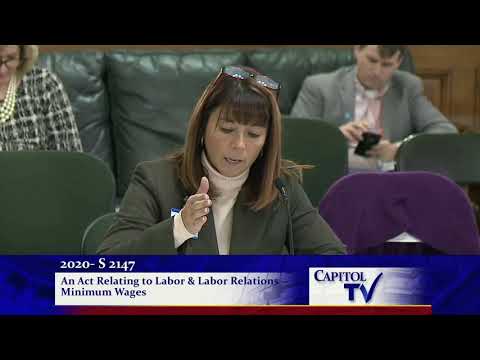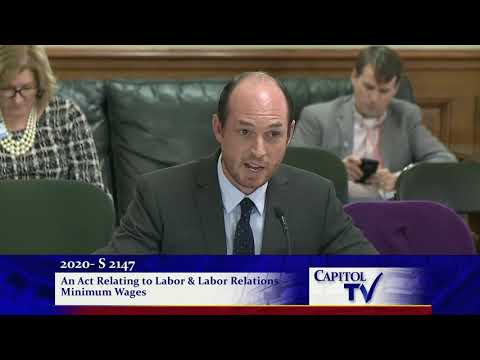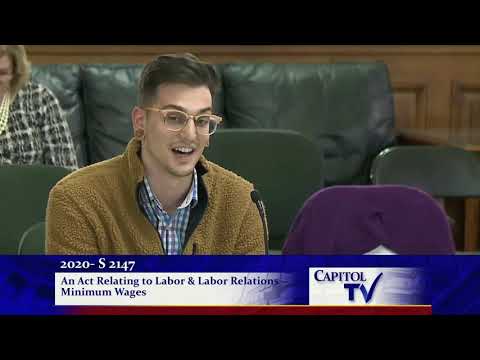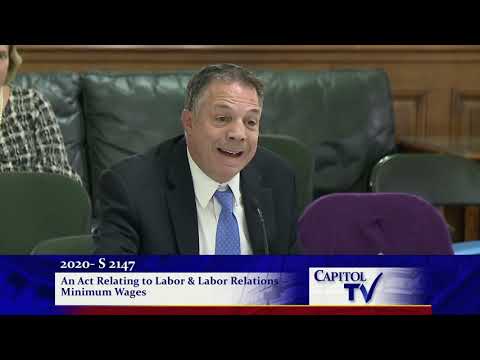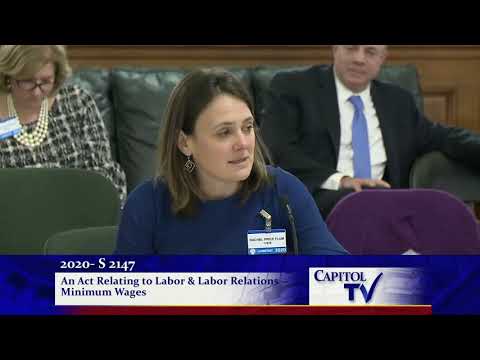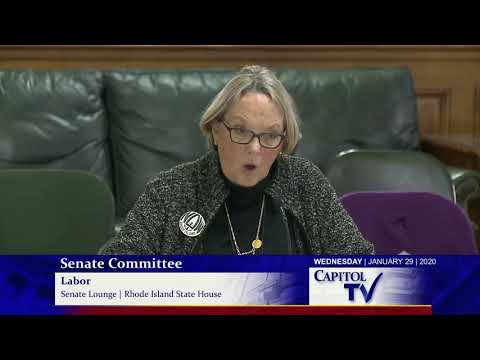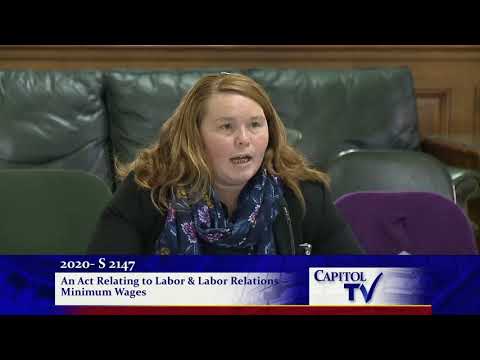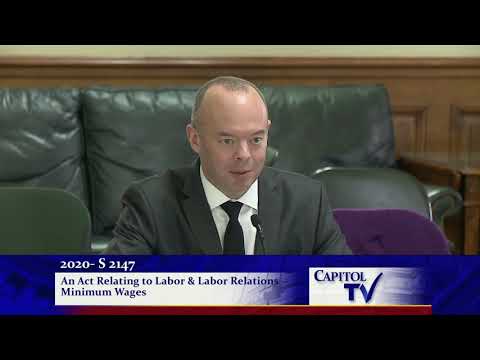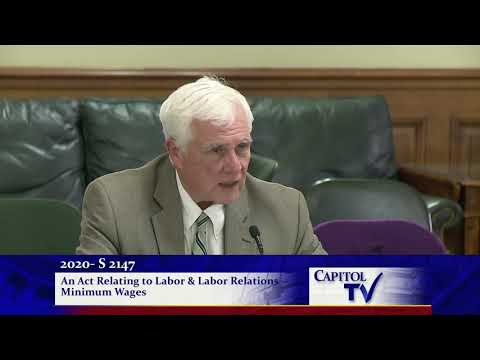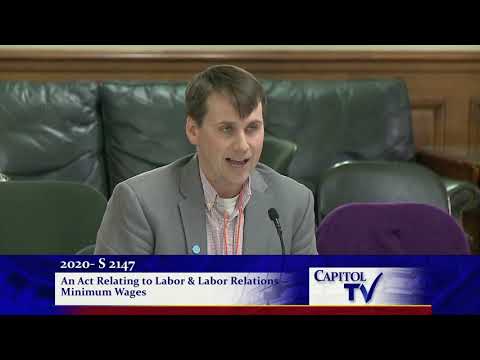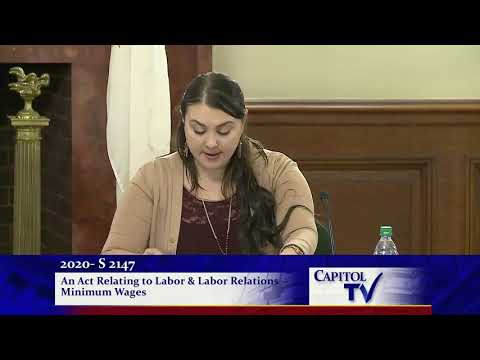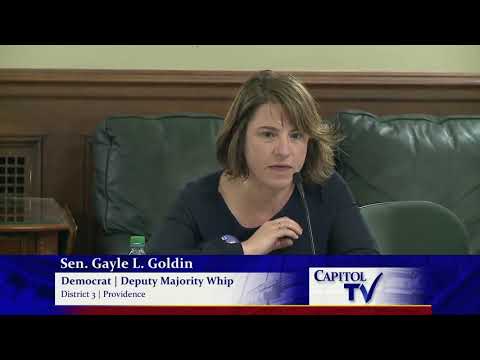Senate Labor passes $1 increase in minimum wage, balks at pathway to $15
“The original bill that we had forth, which I am a cosponsor of, would have created… predictability,” said Senator Gayle Goldin (Democrat, District 3, Providence). This bill “only addresses one year. This [bill] is a strategy that just kicks the problem down the road. Instead of addressing the long term economic needs of our families in Rhode Island, it is
January 30, 2020, 1:12 pm
By Steve Ahlquist
“The original bill that we had forth, which I am a cosponsor of, would have created… predictability,” said Senator Gayle Goldin (Democrat, District 3, Providence). This bill “only addresses one year. This [bill] is a strategy that just kicks the problem down the road. Instead of addressing the long term economic needs of our families in Rhode Island, it is just putting us one step forward.”
The Senate Labor Committee yesterday passed a $1 increase in the minimum wage, which if passed in the Senate and the House and signed by Governor Gina Raimondo, would raise the rate from $10.50 to $11.50 in October. The current minimum wage in Massachusetts is $12.75 and in Connecticut it is $12. Both states are also on the path to $15 an hour, with predictable, scheduled increases over the next few years.
The original bill to be heard was S2147, which would have increased “the minimum wage gradually up to fifteen dollars ($15.00) per hour by the year 2024, wit a 75 cent increase in July 2020 and a 75 cent increase in January 2021.
I asked Senate Spokesperson Greg Paré why the changes were made to Senator Erin Lynch Prata (Democrat, District 31, Warwick, Cranston)’s bill. He told me that Senate President Dominick Ruggerio (Democrat, District 4, Providence) prefers to revisit the issue on an annual basis, and not lock the state into a path towards $15.
The testimony for and against the bill was telling, with expensive lobbyists representing powerful business interests advocating against raising the minimum wage, and representatives from various social justice groups and labor organizations arguing for an increase and a path towards $15.
Lobbyist Elizabeth Suever, who works for the law firm of Adler, Pollock and Sheehan, is paid $100,000 annually by the Greater Providence Chamber of Commerce and an unknown amount from the Rhode Island Retail Federation to advocate against low wage workers, mostly women, receiving a living wage.
“The Greater Providence Chamber of Commerce and the Rhode Island Retail Federation are urging the General Assembly to do an economic impact study to figure out what the appropriate minimum wage for the state of Rhode Island is,” said Suever to the Senate Committee. “We do not know if $11.50 is the correct number, but we’d like to know what that number is so that we could then incrementally work towards it. We’re concerned that if we pick a number that is too great for our business community to bear, that we may be risk losing jobs to automation or downsizing, which would harm workers and the workforce in the state of Rhode Island.
“We also would like to urge the committee to consider predictability in the minimum wage,” continued Suever. “It’s very important for our local businesses to have an idea of what their labor costs are going to be over the next several years. So any increase that is contemplated by this committee, we would like it if that was stepped in, similar to what happened two, three years ago, where it was raised over a period of two years. That provided predictability to our Rhode Island businesses. Finally, this Sub A has an increase slated for October in 2020. I have been told by our HR [Human Resource] professionals that they would prefer it if any minimum wage increase was instituted at the beginning of the calendar year. It’s harder for them to update their systems mid year. So it’d be preferable if any minimum wage increase were to go into effect January 1st.”
Lobbyist Lenette Forry-Menard, representing the New England Convenience Store and Energy Marketers Association ($3166 monthly), the Rhode Island Hospitality Association ($25K annually) and the Northern Rhode Island Chamber of Commerce ($3k monthly) also argued against raising the minimum wage.
Lobbyist Christopher Carlozzi, representing the National Federation Of Independent Business (NFIB) is paid $10,500.00 a month to argue against a minimum wage increase that would benefit low-income working families.
“NFIB still remains opposed to this bill raising the minimum wage to $11.50 per hour,” said Carlozzi. “It’s important to note that small businesses are often impacted hardest when the minimum wage increases. They can’t spread that cost out through multiple stores through multiple lower cost states. It’s often those one shop, small businesses that find it the hardest to absorb those labor cost increases. In fact, most small businesses are already facing things like paid sick leave, higher energy prices, rising healthcare costs.
“…things like unemployment insurance and workers’ compensation insurance are tied to minimum wage increasing. So payroll goes up across the board. For a small business, labor costs do not happen within a vacuum. And it becomes easy for that business owner to become overwhelmed when expenses grow. The groups most impacted by wage increases are younger and unskilled workers. I won’t go over all the reports that I usually cite, but those are the people that are impacted most when a wage hike happens. Those are the people that have crowded out of the job market. And I’d also add that Rhode Island is one of the few States that does not have a teen training wage – 39 other States have one. It would be something that would help encourage small businesses to hire younger workers, even if it’s just for, for three months, for a finite period of time, at 80 percent of the minimum wage.
“It helps teach those young, young workers in valuable work skills that they carry throughout their entire lives,” continued Carlozzi. “There’s another issue regarding time and a half pay for certain businesses that have hourly workers on Sundays and holidays. Rhode Island will be the only state left once Massachusetts phases it out in 2023 that will have a time and a half pay law. Under the current proposal here, that would mean a $17.25 cent minimum wage, which would put Rhode Island at a competitive disadvantage with both Massachusetts and Connecticut on Sundays and holidays. This would be one of the larger minimum wage hikes, they’ve been smaller in the past – 40, 50 cents. Also, the timing of it as noted before, one of the things I did want to bring up that I was looking at the DLT [Department of Labor and Training] jobs numbers and one sector that did lose ground from December of 2018 to December of 2019 was the retail sector. Brick and mortar retail industry, often higher minimum wage positions.
“I’m not saying that a minimum wage increases and higher labor costs are the only things that would cause job loss in that sector, but that is one sector that’s finding it very difficult to compete online. So the higher labor costs are for those types of small businesses, the harder it is for them to compete against larger businesses. So some of the things that could happen with minimum wage increases: higher prices for products. But once again, people are only willing to pay so much for pizza or a hamburger before they start buying less. A lot of areas that have raised the minimum wage are seeing fewer hours available. So while people are making more per hour, their paychecks are smaller because there are fewer hours available to work,” concluded Carlozzi. “And of course, the most drastic scenario is reducing staff and moving to kiosks or tablets. So we will say that the minimum wage increase will have a serious impact on the state’s small businesses.”
Benjamin Branchaud representing the Carpenter’s Union – Local 330, was in strong support:
Senator Leonidas Raptakis (Democrat, District 33, East Greenwich) is the owner of Venus Pizza in Coventry. He has long been an opponent of raising the minimum wage, and has his own bill that would freeze the minimum wage where it is and only raise it in sync with the Consumer Price Index (CPI).
Interestingly, when labor officials such as Patrick Crowley and George Nee entered the room to testify on the minimum wage bill, Senator Valerie Lawson (Democrat, District 14, East Providence, Pawtucket), who works for Labor in the state, recused herself, leaving the room.
Why does Lawson have to recuse herself while Raptakis is free to vote on, speak on and introduce legislation that will directly affect him and the business he owns?
Rachel Flum, Executive Director of the Economic Progress Institute, spoke in strong support, and contradicted some of the arguments made by the corporate lobbyists above.
“We’ve had retail businesses tell us they can’t hire frontline staff because people can go right across the line to Massachusetts and make $12.75 an hour or they can go to Connecticut and make almost $12,” said Flum. “We also know that we have a crisis in our caregiving workforce, both for those who take care of healing children and those who take care of our senior population. Again, those are low wage workers who can go right across the line and work in our neighboring States who have higher minimum wages.
“If the federal minimum wage had kept place, it would be over $20 an hour.
$10.50 is not a wage that people can support themselves on,” continued Flum. “We heard that mostly it’s teenagers – that is not true. Included in your packet today is a MythBuster that shows that the reality is the average minimum wage worker is 35 years old. 30 percent are 40 years old or older. 60 percent are women. 25percent of them have children, 50percent of them work full time. These are not students that we’re talking about. These are parents with children who are trying to make ends meet in our state and we should support them better than $10.50 an hour. Lastly, we know that increasing the minimum wage supports communities that have been left behind. We know that it would support one in two Black and Latino workers and two in five women.

“I also have included in my testimony contradictions to the arguments that businesses are hurt by that,” continued Flum. “If you look at the studies, overwhelmingly that has not been shown to be the case. New York City just increased their minimum wage to $15 an hour and saw no negative impact. We know that the money that goes into families pockets with increased minimum wages goes right back into the local economy and we know also that studies are increasingly showing the health benefits of making sure that people have a living wage. Studies recently are showing how suicide rates go down when we increase the minimum wage. If you think about your own life and whether you could balance your budget on $10.50 an hour, I think we can all agree that we couldn’t and we need to do better for our workers and families.
“Even if they are teenagers, we know that a significant number of teenagers who are earning minimum wage are supporting their families,” said Flum. “They may need to have multiple people in the family earning minimum wage in order to meet their family budget. So I don’t think it’s correct to assume that just because someone is a teenager, they shouldn’t get paid a livable wage because they may be supporting other people even if they don’t have their own kids.”
Gail Harvey from the Rhode Island Chapter of the National Organization of Women (RINOW) spoke in strong support.
Nicole O’Laughlin representing SEIU1199 spoke in strong support:
Patrick Crowley from NEARI spoke in strong support. As Crowley entered the room to testify, Senator Lawson recused herself.
George Nee from the AFL-CIO spoke in strong support.
“We are firmly committed, as an organization, for a path to $15 an hour, but you get there one jump at a time and this is a very significant jump. $90 a week,” said Nee, “That’s the difference right now between Rhode Island and Massachusetts.
“For a low income person or for a lot of people, $90 a week is a lot of money and we are getting further and further behind from our neighbors, particularly Massachusetts and even Connecticut,” continued Nee. “A lot of the people who work in the big retail stores and the fast food stores. They are very profitable companies. Yet in Massachusetts they could find a way to make sure these people are being paid $12.75. Our people in Rhode Island are making $10.50. The price of the food and the price of the products you buy are the same. Think about it this way.: Rhode Island minimum wage, low income workers are subsidizing these big corporate entities with their headquarters out of the state. It’s like money flying out of the state to go to them instead of staying in the pockets of Rhode Islanders who will spend the money in the local economy.
“The Department of Labor estimates that there are about 25 to 30,000 people who make the minimum wage in the state of Rhode Island. It’s a lot of people. This is a very significant piece of legislation. This will be a very good step, particularly getting it in October,” concluded Nee. “I know that there’s some opposition to that, but we’ve already lost a year, so let’s, let’s not lose any further time.”
John Wesley, Director of Policy at the Rhode Island Coalition Against Domestic Violence (RICADV), spoke in strong support.
Senator Sandra Cano (Democrat, District 8, Pawtucket) spoke in favor of the legislation, but also lamented that no path to $15 was included:
“I’d love the minimum wage to be raised to $11.50, although I’m a little disappointed that the original bill is not up for a vote tonight,” said Cano. “I do believe that we are losing a lot of skilled labor to our neighbor states… It was also said that it’s important to have predictability through years ahead, which the bill that we passed last year certainly did have. I believe that this is not only important for the working people of Rhode Island it is also an equity issue and we can not afford to lose more of our skilled workers to our neighbor states. We also need to make sure that we continue a good path for Rhode Islanders so they can have economic security. So I will be voting for this bill, although I hope that we, in the future, also have the pathway for the $15 minimum wage.”
Senator Gayle Goldin (Democrat, District 3, Providence) also expressed her support, and disappointment that no path to $15 was included in the bill.
“It’s not often that Elizabeth Suever and I agree on anything related to labor policy, but she did repeatedly mentioned that the business community believed hat predictability was incredibly important to them,” said Goldin. “The original bill that we had forth, which I am a cosponsor of, would have created that predictability. And the Sub A only addresses one year. This Sub A is a strategy that just kicks the problem, kicks the can, down the road. Instead of addressing the long term economic needs of our families in Rhode Island, it is just putting us one step forward. I of course, support an increase in the minimum wage, but I think doing so without recognizing the impact of what’s going on in Massachusetts and Connecticut and what that actually means for our workforce and Rhode Island is is shortsighted.
“I will be supporting putting this bill to the floor, but frankly I do so with a heavy heart that we haven’t passed the original bill,” continued Goldin. “As somebody who also was the cosponsor of eliminating the tipped minimum wage in Rhode Island, I am also think it’s important for us to acknowledge that that was not even addressed in this bill to begin with. And we will once again create an even greater uncertainty and create greater disparity for our lowest wage working women in this state by not addressing the tipped minimum wage.”
Senators Jessica de la Cruz (Republican, District 23, Burrillville, Glocester) and Frank Lombardo (Democrat, District 25, Johnston) voted against the bill. Senators Frank Ciccone (Democrat, District 7, North Providence), Sandra Cano, Frank Lombardi (Democrat, District 26, Cranston) and Senator Gayle Goldin voted in favor.
Senator Joshua Miller (Democrat, District 28, Cranston) did not attend the meeting and Senator Lawson recused herself.
The bill now goes to the Senate floor for a full debate and vote. Passage in to law requires a House bill and the Governor’s signature.

Elizabeth Suever 
Lenette Forry-Menard 
Leonides Raptakis 
Rachel Flum
UpriseRI is entirely supported by donations and advertising. Every little bit helps:
Become a Patron!



